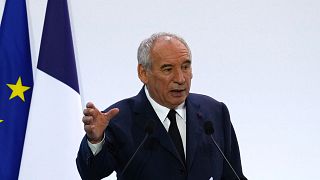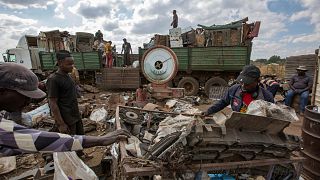Zimbabwe
Zimbabwean banks on Tuesday began issuing new notes and coins aimed at easing severe cash shortages, but they are severely limiting the amounts that people can withdraw.
“What can I do with such a pittance?” asked Shorai Tomu after withdrawing the equivalent of about $5. “It can only buy five loaves of bread.”
The new notes are the latest currency reform in the troubled southern African country’s constantly changing, and at times confusing, monetary framework.
Zimbabwe now has the world’s second highest inflation after Venezuela, according to International Monetary Fund figures. With prices rising faster than at any point in a decade amid rapid devaluation of the local currency, cash is king.
In 2009, Zimbabwe’s government abandoned the local currency amid hyperinflation and adopted a multi-currency system dominated by the dollar. In June the government outlawed the use of foreign currencies, opting for a local currency mainly consisting of electronic and mobile money and a trickle of bank notes.
President Emmerson Mnangagwa has struggled to fulfill promises to improve the economy two years after taking office following the resignation of the late Robert Mugabe.
Many retailers and service providers now demand payments in cash only. Others, including street vendors, charge a higher price for goods paid for using mobile money or bank cards.
The Reserve Bank of Zimbabwe says it will “drip feed” ZW$1 billion in the new small notes and coins to manage the cash shortages. The highest denomination is ZW$5. The notes are strikingly similar in design to the old ones.
“It is just like the old money, and like the old money it can’t buy anything of value,” said 81-year-old Filbert Sibanda after withdrawing his monthly pension, enough to buy a kilogram of beef.
Other customers left disgruntled.
“This is not an improvement,” said Wicknell Magidha, waving a few new notes and a plastic bag filled with coins. “These coins are just too heavy.”
People trooped out of one bank carrying similar bags of coins, shaking their heads. Others in line laughed.
Magidha said the small bills and coins leave him with another headache, that of haggling with traders who usually reject them.
“The same item can have three different prices: one for cash, one for mobile money and another one for those paying using small coins,” Magidha said. “The government should just print higher denominations to match this inflation.”
AP













Go to video
Zimbabwe court rejects opposition bid to block Gukurahundi massacre hearings
02:19
South African actor Embeth Davidtz makes directorial debut with Rhodesia-set drama
Go to video
To avoid conflicts with locals, Zimbabwe tracks elephants with GPS
Go to video
Putin hosts talks with African leaders on security
11:14
Power Play or Partnership? America’s Strategy in Africa [Business Africa]
Go to video
Harare City Council says bedbug infestation confined to only one locality